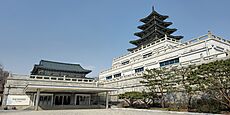National Folk Museum of Korea facts for kids
 |
|

View of the Museum's main entrance
|
|
| Established | 1924 |
|---|---|
| Location | Samcheongdong-gil 35, Jongno-gu, Seoul, South Korea |
| Visitors | 1,813,626 (2017) Ranking 31st globally |
| Public transit access | Subway Line 3, Anguk Station, Exit 2 |
| Korean name | |
| Hangul |
국립민속박물관
|
| Hanja |
國立民俗博物館
|
| Revised Romanization | Gungnip Minsok Bangmulgwan |
| McCune–Reischauer | Kungnip Minsok Pangmulgwan |
The National Folk Museum of Korea is a special museum in Seoul, South Korea. It is located inside the beautiful Gyeongbokgung palace grounds. This museum helps visitors understand the traditional life of Korean people. It uses copies of old objects to show how people lived long ago.
Contents
Museum History
How the Museum Started
The museum's story began in 1924. It was first called the Chōsen Folk Art Museum. Three people named the Asakawa brothers and Yanagi Sōetsu helped create it. This was during a time when Japan ruled Korea.
Moving to Its Current Home
After Korea became free, a new museum with the same name opened. This happened on November 8, 1945. It first opened its doors to visitors on April 25, 1946. Later, this museum joined with the National Museum of Korea. Its collection of over 4,500 items moved to a new place.
In 1975, the National Museum moved to the Gyeongbokgung palace grounds. The folk museum moved with it. Finally, in 1993, the National Folk Museum opened in its current building. This building used to be where the National Museum of Korea was. The design of the museum building looks like many old Korean buildings.
What You Can See: The Collections
The museum has more than 98,000 amazing items! It has three main areas where you can see different exhibits.
History of Korean Life
One main hall is called "History of Korean People." Here, you can see everyday items from Korea's past. These items show how people lived from ancient times up to 1910. That was the end of the Joseon period.
Korean Ways of Living
Another hall is "Korean Way of Life." This part of the museum shows how Korean villagers lived a long time ago. You can learn about their daily routines and traditions.
Life Cycle and Culture
The third hall is "Life Cycle of the Koreans." This exhibit explains how Confucianism deeply shaped Korean culture. It shows how this way of thinking led to many of Korea's customs.
Outdoor Exhibits
Outside the museum, there are also cool things to see. You can find copies of spirit posts. Villagers used these posts for prayers. There are also stone piles for worship. You can see old grinding mills and shelters for storing rice. There are even pits where people used to keep kimchi pots!
New Exhibits
In March 2021, the museum opened a new exhibit. It shows items from the 20th century. You can see things from the Joseon era and also from modern Korea. This new display is in Permanent Exhibition Hall 2.
Gallery
Visiting Hours
The museum is open from 9:00 AM to 6:00 PM between March and October. From November to February, it closes a bit earlier, at 5:00 PM. On Saturdays, from March to October, you can visit until 8:00 PM. There are no late hours from November to February. Also, the last Wednesday of every month is "Culture Day."
See also
 In Spanish: Museo Folclórico Nacional de Corea para niños
In Spanish: Museo Folclórico Nacional de Corea para niños
- Culture of Korea
- List of museums in Seoul
- List of museums in South Korea
 | Delilah Pierce |
 | Gordon Parks |
 | Augusta Savage |
 | Charles Ethan Porter |













